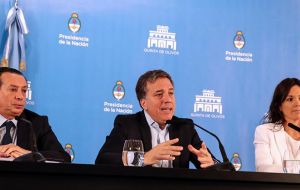MercoPress. South Atlantic News Agency
Argentina’s president attempts to improve his fading chances of re-election (*)
 Although Mr. Macri has been a pro-business president, his government largely blames business for these woes
Although Mr. Macri has been a pro-business president, his government largely blames business for these woes  A government minister lambasted supermarkets for raising prices by up to 15% in the 48 hours before the price freezes were announced
A government minister lambasted supermarkets for raising prices by up to 15% in the 48 hours before the price freezes were announced  “April, perhaps, is already lost to the inflation spiral,” he said. “If we don’t see evidence of inflation coming down in May, we will be fried.”
“April, perhaps, is already lost to the inflation spiral,” he said. “If we don’t see evidence of inflation coming down in May, we will be fried.” Mauricio Macri's original plan was to address Argentina’s citizens on television on the final working day before the Easter break. But he opted for a folksier way of presenting an economic package that he hopes will rescue his chances of being re-elected president in October. He appeared in a taped video, knocking on the door of a house belonging to a young working-class couple, then sitting down with them to explain his plan.
”We’ve done everything to try to fix the long-term in our country, and we’re going to win the battle,” said Mr. Macri from the couple’s living-room. “We’re now giving you a respite, some relief for the months ahead.” He left it to his ministers to fill in the details at a press conference.
The measures are a change of course for a president who sought to undo the effects of more than a decade of populist government. The most important one is a revival of a price-control mechanism in force under the two Peronist presidents who preceded him, Néstor Kirchner and his wife, Cristina Fernández de Kirchner. In Mr. Macri’s version, which he, like the Kirchners, calls “precios cuidados” (“curated prices”), the price of 64 consumer items, from milk to jam, will be frozen for six months (ie, until the eve of the election). An “army” of inspectors, under the direction of the production ministry, will enforce supermarkets’ adherence to the freeze. The government also said it would not go ahead with planned price rises this year in electricity, gas and public transport.
In another move to contain inflation, the central bank said it would not allow the peso to weaken as much as it had planned. Starting this week it will spend up to US$60m a day to support the currency. The money comes from the IMF, which has agreed to lend Argentina US$ 57bn to support economic reforms. The government has also opened new credit lines for pensioners and families with children and expanded a plan to build new homes with state financing.
These are desperate responses to a bleak economic situation. Prices in March were 54.7% higher than during the same month a year before. Food and drink prices rose 64% in the past 12 months. The price of mincemeat in Buenos Aires rose by a staggering 134%. The IMF expects inflation this year to be 43.7%, but some economists fear it will top 50%. The high interest rates needed to contain inflation have caused a recession. GDP, which contracted by 2.5% last year, is expected to shrink by a further 1.2% in 2019.
Although Mr. Macri has been a pro-business president, his government largely blames business for these woes. A government minister lambasted supermarkets for raising prices by up to 15% in the 48 hours before the price freezes were announced. “April, perhaps, is already lost to the inflation spiral,” he said. “If we don’t see evidence of inflation coming down in May, we will be fried.”
Usually businesses do not raise prices out of spite. High inflation is difficult to stop once it has started because higher prices encourage demands for higher wages, which in turn force producers to push up prices. A trigger in Argentina was a sharp decline in the value of the peso. In March the IMF warned that “breaking inflation inertia will be a lengthy process”, which will depend largely on the central bank’s control of growth in the money supply.
The Macri government’s new tactic is unlikely to defeat inflation. Price controls on selected supermarket products imposed by the Kirchners from 2007 to 2015 had a temporary effect on overall inflation and did not tame growth in the prices of other products, according to a study by Diego Aparicio of MIT and Alberto Cavallo of Harvard University. Although the economists did not find evidence of shortages of price-controlled goods, supermarkets were able to dodge some price controls by introducing new varieties at higher prices.
The IMF welcomed the central bank’s change to the trading range of the peso. But it is likely to take a dimmer view of the price controls. Delayed price increases for public services risk widening the budget deficit beyond the limit set by the IMF.
But it is Argentine voters, not the IMF, whose approbation Mr Macri needs now. The latest polls suggest that he could lose to Ms Cristina Fernández, even though she has been indicted on several counts of corruption. Senior figures in his Cambiemos (Let’s Change) alliance are considering nominating someone to challenge him for the nomination to be the grouping’s presidential candidate in primaries scheduled for August. Mr. Macri does not have time for the “persistence and consistency” the IMF recommends.
(*) The Economist




Top Comments
Disclaimer & comment rules-

-

-

Read all commentsTell me EM is anyone in Argentina honest or is it a natural trait that everyone is corrupt? Must be in the genes I suppose as most are descendants of Italians, ( Mafia springs to mind )
Apr 23rd, 2019 - 08:05 am +2Last-minute, half-cooked, desperate measures is all a cornered Argentine government seems to be able to produce.
Apr 22nd, 2019 - 07:17 pm -2So, what happened?
On one hand, Macri surfed to power in 2015 on a handful of false promises that included improving the economy and ending government corruption.
More than three years later, Macri has nothing to show – not only the economy did not get better; it got worse, much worse. On top of that, it’s now dawning that the Macrists' claim “they stole everything,” created a wave of outrage on Kirchner's alleged systemic corruption and helped Macri win the election but may have been a bunch of lies orchestrated by judges, prosecutors, intelligence agents, well-known journalists and mainstream media outlets.
In addition, numerous cases of corruption have been consistently surfacing, such as the Argentine CorreoGate, in which the Macri Group negotiated with the Macri government in a bid to greatly reduce a debt with the state to almost zero. When a prosecutor uncovered the affair, Macri quickly backtracked, saying “nothing has been yet done” and that “everything would be reset to zero.”
GC
Apr 23rd, 2019 - 06:18 pm -2If you are unable to write anything remotely insightful, you could instead try something such as gardening. It's good for the soul.
As for the Argentines, yes, they've been cheated and unknowingly opened the door to their worst enemy, but they will find their own way out -- without your help of course.
Commenting for this story is now closed.
If you have a Facebook account, become a fan and comment on our Facebook Page!